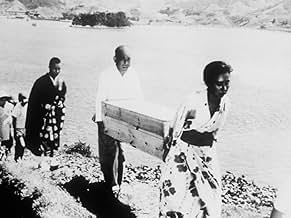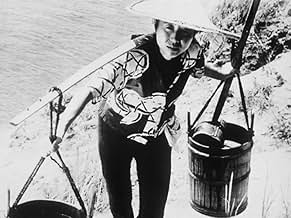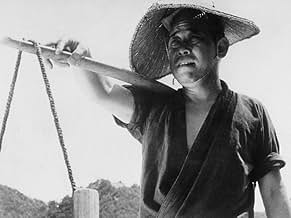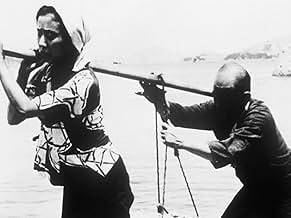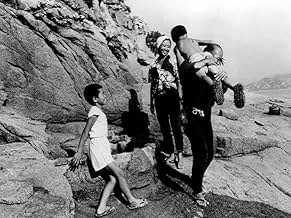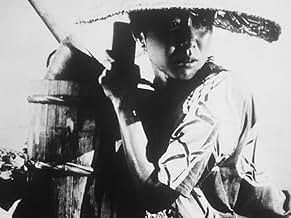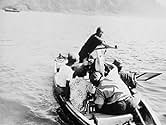IMDb RATING
8.0/10
6.6K
YOUR RATING
A family of four are the sole inhabitants of a small island where they struggle each day to irrigate their crops.A family of four are the sole inhabitants of a small island where they struggle each day to irrigate their crops.A family of four are the sole inhabitants of a small island where they struggle each day to irrigate their crops.
- Nominated for 1 BAFTA Award
- 5 wins & 1 nomination total
- Director
- Writer
- All cast & crew
- Production, box office & more at IMDbPro
Featured reviews
I was surfing on the t.v. and came across this incredible "little" film on a French Canadian station. As there is no dialogue and the story is so human and pure, it is truly the most universal picture I've seen. I defy anyone not to be moved by the challenges which the characters face, the realism in the minimalist acting and the beauty of the simplistic black and white camerawork. I've never heard of this film, but I will tell all my friends about it.
10billr-3
I remember this film from my student days. I saw it in an uptown, shabby, art house theatre (when art meant porn) in Philadelphia. I was amazed. As I recall, it is a film without dialog. Not silent, but no dialog. Black and white, but singularly visual. Three, maybe four characters with self- effacing directing and camera work, it was as intimate as small off-Broadway theatre. I've seen nothing since as cinematic, or moving. No one I've ever met, has seen it. But I remember it vividly.
I was living next to the Seto Naikai (Inland Sea) at the time this movie was made, and marvel at its matchless, eclectic choice of images and atmosphere to convey the ambiance of the time and place. The photography, music, and restrained acting are perfection itself. The lack of dialogue helps, rather than hinders, its beautiful, simple story. It has captured a Japanese way of life and culture (actually lived by the director---the movie was made as a tribute to his parents) forever and in the very highest artistic sense. The movie is so genuine, so sympathetic to its participants and subject matter, that the viewer is softly, irresistibly, drawn in to share their travails. For years it has been a wonder to me why this classic film has been forgotten. Of the thousands of movies I have seen in my lifetime, this is the finest.
In a time where cinema was in the whole world was still concerned by representation of lives and social studies, this movie is an intense an important piece. It's great! Strong, hard, oppressing, nice, and emotive. Everything in the hard (but sometimes amazing) life of those workers is showed in it... It's really something the cinema can do at his best. A social study showing every aspect of a style of life, with its private feelings and possible events (thoose who are saying nothing happens mustn't have watched the whole movie. I was surprised by the changing of rhythm in the last 30 minutes).
It's showing everything essential cinema can show: Life, conditions of life, feelings of those who are living, and it's showing it in a very good way. This is a touching and oppressive movie which could maybe even be used as an historical document (for history of the Japanese island farmers in the middle of the XX century) , but also as an intense fiction.
It's showing everything essential cinema can show: Life, conditions of life, feelings of those who are living, and it's showing it in a very good way. This is a touching and oppressive movie which could maybe even be used as an historical document (for history of the Japanese island farmers in the middle of the XX century) , but also as an intense fiction.
Okay, we have a loving tribute here, personal for director Kaneto Shindo as portraying the life of his parents. We have the rural hardship, and dogged persistence for live in a place where water is painfully hauled over a steep cliff, and we have the quiet cinematic language that describes it.
But also describes a life of simple pleasures. Shindo observes both closely, with sympathy.
The narrative thread of The Naked Island flows with the slow and dull repetition of life itself - if the movie is dull and monotonous it is because life is dull and monotonous and with a handful of fleeting moments of pleasure and joy scattered among the daily routine of making ends meet. In that sense, the artificiality that some reviewers have spoken of (certainly Shindo's decision to include no dialogues and the film almost silent save for a few natural sounds and voices) touches upon the heart of the thing.
The film follows the cycle of the seasons as the family tries to survive in the small island and it is by using the renewal of nature as a backdrop that Shindo draws emphasis on the periodic nature of life and time - the snake that eats its tail. The theme of renewal and the cycle of life and death is further symbolized through long, repetitious sequences of the man and wife transporting irrigation water in large buckets through the steep steps of a hillside and even further as Shindo ends the film cyclically with the same aerial shot that opened it.
The other major triumph for the great Japanese director is the visual language he employs to tell the simple and languidly paced story. This is probably a point that will only interest the avid film buff but I'm fairly sure it's that kind of person only that will seek out such a film anyway. The cinematography consists of full images, superb staging and framing of the (little is the truth) action, images as much beautiful in the subject they present as in the presentation of the subject itself and vibrating with honesty and clarity of vision. As with Kurosawa in DERSU UZALA, The Naked Island captures the essence of 'life as lived in' - the texture, the mood, the smell.
Combined with the symbolism he has carefully planted within the film, The Naked Island is a complete depiction of life on both macrocosmic and microcosmic levels. Of a very specific kind of life the truth is (rural life in a Japanese island in the 30's) but in the larger scheme of things and in the things that actually matter, what is true of one man is true of many.
In an age where directors are content to just wink at their audiences with a sense of smug satisfaction, presenting us with cynic and gimmicky films, swapping emotional catharsis for surprise 'twists', doing away with honest character portrayals in favour of decorating characters with random quirks, having forgotten visual storytelling in favour of redundant voiceovers, shaky cams or self-consciously, witty dialogue; in an age like this, The Naked Island seems to come from another planet, alien to the mentality and ethics of modern cinema as much as its bucolic subject matter is to modern city life. It's definitely not something that will appeal to most but those that will set out looking for it will not be disappointed.
But also describes a life of simple pleasures. Shindo observes both closely, with sympathy.
The narrative thread of The Naked Island flows with the slow and dull repetition of life itself - if the movie is dull and monotonous it is because life is dull and monotonous and with a handful of fleeting moments of pleasure and joy scattered among the daily routine of making ends meet. In that sense, the artificiality that some reviewers have spoken of (certainly Shindo's decision to include no dialogues and the film almost silent save for a few natural sounds and voices) touches upon the heart of the thing.
The film follows the cycle of the seasons as the family tries to survive in the small island and it is by using the renewal of nature as a backdrop that Shindo draws emphasis on the periodic nature of life and time - the snake that eats its tail. The theme of renewal and the cycle of life and death is further symbolized through long, repetitious sequences of the man and wife transporting irrigation water in large buckets through the steep steps of a hillside and even further as Shindo ends the film cyclically with the same aerial shot that opened it.
The other major triumph for the great Japanese director is the visual language he employs to tell the simple and languidly paced story. This is probably a point that will only interest the avid film buff but I'm fairly sure it's that kind of person only that will seek out such a film anyway. The cinematography consists of full images, superb staging and framing of the (little is the truth) action, images as much beautiful in the subject they present as in the presentation of the subject itself and vibrating with honesty and clarity of vision. As with Kurosawa in DERSU UZALA, The Naked Island captures the essence of 'life as lived in' - the texture, the mood, the smell.
Combined with the symbolism he has carefully planted within the film, The Naked Island is a complete depiction of life on both macrocosmic and microcosmic levels. Of a very specific kind of life the truth is (rural life in a Japanese island in the 30's) but in the larger scheme of things and in the things that actually matter, what is true of one man is true of many.
In an age where directors are content to just wink at their audiences with a sense of smug satisfaction, presenting us with cynic and gimmicky films, swapping emotional catharsis for surprise 'twists', doing away with honest character portrayals in favour of decorating characters with random quirks, having forgotten visual storytelling in favour of redundant voiceovers, shaky cams or self-consciously, witty dialogue; in an age like this, The Naked Island seems to come from another planet, alien to the mentality and ethics of modern cinema as much as its bucolic subject matter is to modern city life. It's definitely not something that will appeal to most but those that will set out looking for it will not be disappointed.
Did you know
- Trivia'Hadaka no shima' was made, in the words of its director, "as a 'cinematic poem' to try and capture the life of human beings struggling like ants against the forces of nature."
- ConnectionsReferenced in Century of Cinema: Un siècle de cinéma japonais, par Nagisa Oshima (1995)
- How long is The Naked Island?Powered by Alexa
Details
- Release date
- Country of origin
- Language
- Also known as
- The Naked Island
- Filming locations
- Production companies
- See more company credits at IMDbPro
Box office
- Gross worldwide
- $14,673
- Runtime1 hour 36 minutes
- Color
- Sound mix
- Aspect ratio
- 2.35 : 1
Contribute to this page
Suggest an edit or add missing content



